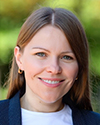
|
Degrees:
Ph.D., Yale Univ.
M.Phil., Yale Univ.
M.S., Central Connecticut State Univ
M.S., Military Univ. of Technology
B.S., Military Univ. of Technology
Dr. Ewa Syta obtained her Ph.D. in Computer Science from Yale University in 2015. Prior to joining Yale, she earned her B.S. and M.S. in Computer Science and Cryptology from Military University of Technology in Warsaw, Poland. Her research interests lie in computer security and distributed systems. The long-term objective of her research is to bring cutting-edge cryptographic techniques to real-world applications to shape tomorrow’s digital world. She has been working on effective identity management methods, stronger anonymous communication technologies, practical privacy-preserving authentication protocols, unbiasable distributed randomness protocols, ways to keep Internet authorities honest and accountable, and most recently, on blockchain technologies, and provable security for real-world protocols. Her current work is funded by the NSF Secure and Trustworthy Cyberspace (SaTC) Medium Collaborative Award: "Applied Cryptographic Protocols with Provably Secure Foundation". As a 2024-2025 Fulbright U.S. Scholar at NASK - National Research Institute in Warsaw, Poland, she worked on the project "Long-term Strategy for the Implementation of an eIDAS 2.0-Compliant Digital Identity Wallet for Poland," combining applied research with policy and deployment strategy to advance the EU's digital identity infrastructure.
Dr. Syta is as enthusiastic about teaching as she is about research. Her teaching interests include cryptography, computer security, privacy, ethical issues in computing, and programming. Dr. Syta’s teaching philosophy reflects her belief that a structured learning environment that supports individual learning styles yields the best results. She strives to create an engaging, open and inclusive forum to facilitate student learning and personal and intellectual growth. Her commitment to teaching excellence has been recognized with the Arthur H. Hughes Award for Teaching Achievement at Trinity College (2022) and the Graduate Teaching Award from the Department of Computer Science at Yale University (2015). |
-
Cryptography and computer security
-
Programming and software design
-
Blockchain technologies
|
-
Provable security for real-world systems
-
Blockchain technologies, distributed systems
-
Privacy-preserving online identity management
|
- J. Kong, D. James, H. Leibowitz, E. Syta, and A Herzberg, CTng: Secure Certificate and Revocation Transparency, Network and Distributed System Security Symposium (NDSS), 2026
- M. Lesniak, M. Wronski, E. Syta, and M. Kutylowski, Unveiling Privacy Risks in Quantum Optimization Services, ACM Asia Conference on Computer and Communications Security (Asia CCS), 2025
- S. Wrotniak, H. Leibowitz, E. Syta, A. Herzberg, Provable Security for PKI Schemes, ACM Conference on Computer and Communications Security (CCS), 2024
- P. Tennage, C. Basescu, E. Kokoris Kogias, E. Syta, P. Jovanovic, B. Ford, Baxos: Backing off for Robust and Efficient Consensus, ACM Symposium on Operating Systems Principles (SOSP), 2023
- A. Herzberg, H. Leibowitz, E. Syta, S. Wrotniak, MoSS: Modular Security Specifications Framework, IACR Annual International Cryptology Conference (CRYPTO), 2021
- E. Kokoris-Kogias, E. Ceyhun Alp, L. Gasser, P. Jovanovic, E. Syta, B. Ford, CALYPSO: Private Data Management for Decentralized Ledgers, International Conference on Very Large Data Bases (VLDB), 2020
- E. Kokoris-Kogias, P. Jovanovic, L. Gasser, N. Gailly, E. Syta, B. Ford, OmniLedger: A Secure, Scale-Out, Decentralized Ledger via Sharding, IEEE Symposium on Security and Privacy (S&P), 2018
- E. Syta, P. Jovanovic, E. Kokoris Kogias, N. Gailly, L. Gasser, I. Khoffi, M. Fischer, and B. Ford, Scalable Bias-Resistant Distributed Randomness, IEEE Symposium on Security and Privacy (S&P), 2017
- E. Syta, I. Tamas, D. Visher, D. Wolinsky, L. Gasser, N. Gailly and B. Ford, Keeping Authorities "Honest or Bust" with Decentralized Witness Cosigning, IEEE Symposium on Security and Privacy (S&P), 2016
- E. Zhai, D. Wolinsky, R. Chen, E. Syta, C. Teng and B. Ford, AnonRep: Towards Tracking-Resistant Anonymous Reputation, USENIX Symposium on Networked Systems Design and Implementation (NSDI), 2016
- E. Syta, M. Fischer, D. Wolinsky, A. Silberschatz, G. Gallegos Garcia and B. Ford, Private Eyes: Secure Remote Biometric Authentication, International Conference on Security and Cryptography (SECRYPT), 2015
- E. Syta, I. Tamas, D. Visher, D. Wolinsky, and B. Ford, Certificate Cothority: Towards Trustworthy Collective CAs, Workshop on Hot Topics in Privacy Enhancing Technologies (HotPETs), 2015
- D. Wolinsky, E. Syta, and B. Ford, Hang With Your Buddies to Resist Intersection Attacks, ACM Conference on Computer and Communications Security (CCS), 2013
|
- Charles A. Dana Research Associate Professor, Trinity College, 2025-27.
- Fulbright U.S. Scholar, "Long-term Strategy for the Implementation of an eIDAS 2.0 Compliant Digital Identity Wallet for Poland", 2025
- NSF Secure and Trustworthy Cyberspace (SaTC) Medium Collaborative Award: "Applied Cryptographic Protocols with Provably Secure Foundation", 2022-2026
- Faculty Excellence Award: Outstanding Scholar, 2024
- Arthur H. Hughes Award for Teaching Achievement, 2022
- Graduate Teaching Award, Department of Computer Science, Yale University, 2015
- 2015 Rising Stars in EECS, Massachusetts Institute of Technology, 2015
- Selected for the 1st Heidelberg Laureate Forum, Heidelberg Laureate Forum Foundation, 2013
|
|
|